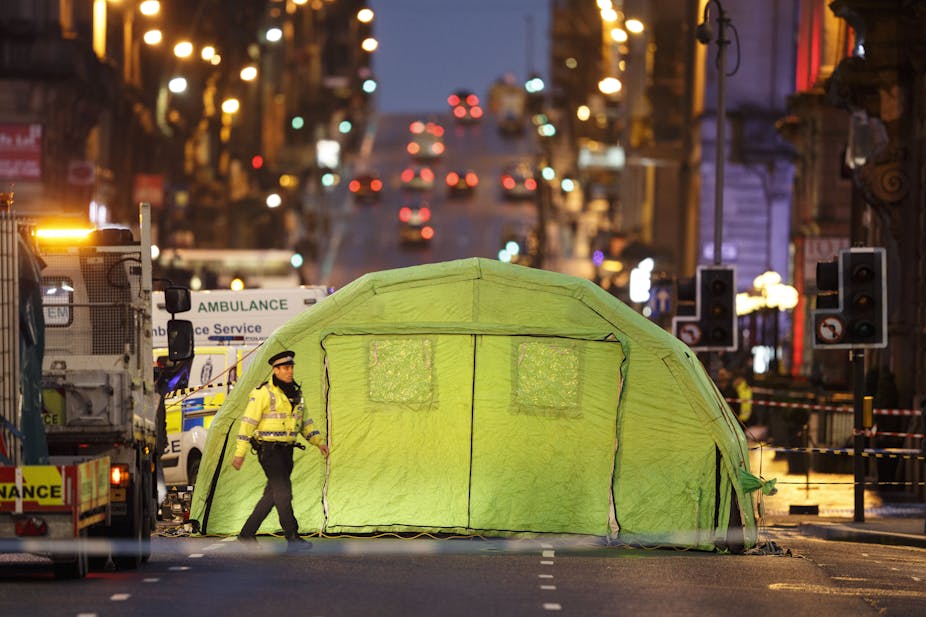Stunned, open-mouthed, horrified. How else to describe the events in Glasgow three days before Christmas as a council refuse lorry ran out of control in George Square in the heart of the city? It mounted pavements, knocking down shoppers and pedestrians, under the glare of the Christmas lights and fairground amusements. Six people dead and eight more seriously injured. It’s a terrible, tragic accident to bring the year to a close.
And it’s the kind of year that has not been seen here for a long time, if ever. It began following a dreadful low point, if we go back to last November, when ten people died as a police helicopter plummeted into the Clutha Vaults pub near the city centre.
In between we’ve seen several incredible highs as the city first played host to the Commonwealth Games and then George Square became both an emotional heart and rallying point for many supporters of the Yes campaign during the independence referendum. If it seems almost trite to add that Glasgow School of Art’s iconic library burned down too, that says something in itself. For contrasting reasons, the enduring legacies of this year of very mixed emotions will last a long time.
The success of the games
Back in the summer, the Commonwealth Games allowed the city to bask in the glow of international attention. Television crews from across the world mingled with athletes and visitors in George Square, adjacent to the magnificent Victorian-era City Chambers. Laid out in 1781 and named after King George III, the city’s central square has been a common thread through much of the year’s events, adding to what was already a very rich history.

There was opposition to the games, some of it reflected in political events in the square, from activists and others who felt the huge sums spent would have been better addressing poverty and other social problems in the city. But while the games’ longer-term legacy also remains controversial, the event itself was widely regarded as a huge success – at least in terms of organisation and delivery, and the unprecedented medal haul by Scottish athletes (4th on the leaderboard).
The hosting of the games was intended to crown longstanding efforts to challenge the dominant UK-wide view of the city as the example, par excellence, of urban decay, dereliction, deviancy, political agitation, slums, bad health and violence. Even if some residents have sometimes tried their best to live lives that seem only to confirm the worst of the city’s negative stereotypes, the reputation of Glasgow as a hard place for hard people is not recent. It traces back to the mid to late nineteenth century, when it was the “second city” of the British Empire.
Glasgow at war
This second city status within the empire was already coming to an end by the close of World War I, the centenary of the start of which was also marked in 2014 with a visit from prime minister David Cameron and the UK’s other main political leaders. More Glaswegians rushed to enlist for that war than any other city in the UK. The annual Remembrance Sunday commemoration in George Square in November was perhaps even more emotional than usual, given this historic legacy.

World War I was also the era in which Glasgow’s reputation as a bastion of socialism, trade-union militancy and political agitation was consolidated. This culminated on Friday January 31 1919 with the so-called “Battle of George Square”, when a demonstration of more than 60,000 workers prompted sufficient fears of a Bolshevik uprising that the tanks of the British Army were deployed.
Fast forward 95 years and George Square was back at the centre of British political events this September during the Scottish independence referendum. It became one of the key meeting places and rallying points for supporters of the Yes movement, gathering night after night under scores of Saltire flags. After all the constituencies of the city voted Yes, there were calls to rename George Square as Freedom, or even Independence, Square. On September 19 it was also the site of a skirmish as members of various Loyalist and far-right pro-UK groups celebrated the victory of the No campaign by engaging in violent disorder.

“I belong to Glasgow…”
If this felt like a low after such an invigorating campaign, it has since been eclipsed by the current refuse-lorry tragedy, for whose victims a memorial service has been held. This latest sad turn of events makes it harder still to take in how much this one part of Scotland’s largest city has witnessed during the past year. Many have commented during this time on the unique character of Glasgow people, and the spirit that they are said to possess.

If all cities are unique in some ways, Glasgow’s uniqueness is shaped by history, by geography, by politics, by global change, by migrations, by fortunes and many misfortunes. “I belong to Glasgow, dear old Glasgow town, but something’s the matter with Glasgow, for it’s going round and round,” sings the first two lines of the famous song of the city.
As well-wishers lay so many flowers in George Square under the Christmas lights, the city’s central plaza has been the focal point for this cycle of joy and sadness like so many times before. What an unbelievable year.

